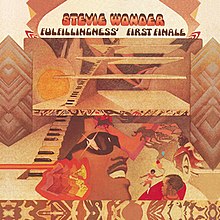| Fulfillingness' First Finale | ||||
|---|---|---|---|---|
 | ||||
| Studio album by | ||||
| Released | July 22, 1974 | |||
| Studio |
| |||
| Genre | Progressive soul[1] | |||
| Length | 42:21 | |||
| Label | Tamla | |||
| Producer |
| |||
| Stevie Wonder chronology | ||||
| ||||
| Singles from Fulfillingness' First Finale | ||||
| ||||
Fulfillingness' First Finale is the seventeenth studio album by American singer, songwriter, musician, and producer Stevie Wonder, released on July 22, 1974, by Tamla, a subsidiary of Motown Records. It is the fourth of five albums from what is considered Wonder's "classic period".[2][3][4]
The album was Wonder's second to top the Billboard Top LPs & Tapes chart, where it remained for two weeks, and also reached number one on the Billboard Soul LPs chart, where it spent eight non-consecutive weeks between October 5 and Christmas 1974.[5] At the 17th Annual Grammy Awards, it won in three categories: Album of the Year (Wonder's second consecutive win in this category), Best Male Pop Vocal, and Best Male Rhythm and Blues Vocal Performance (for "Boogie On Reggae Woman") at the ceremony held in 1975. Retrospectively, the album was voted number 413 in the third edition of Colin Larkin's All Time Top 1000 Albums (2000)[6] and included in the book 1001 Albums You Must Hear Before You Die.[7]
| Review scores | |
|---|---|
| Source | Rating |
| AllMusic | |
| The Austin Chronicle | |
| Christgau's Record Guide | A−[10] |
| Encyclopedia of Popular Music | |
| The Great Rock Discography | 7/10[12] |
| Los Angeles Times | |
| MusicHound Rock | 4/5[14] |
| Q | |
| The Rolling Stone Album Guide | |
| The Village Voice | B+[17] |
- ^ Kendall, Jo (May 5, 2019). "Record Collection". Prog. Retrieved January 23, 2021 – via PressReader.
- ^ Bogdanov, Vladimir; Woodstra, Chris; Erlewine, Stephen Thomas (2001). All music guide: the definitive guide to popular music (4 ed.). Hal Leonard Corporation. pp. 447–448. ISBN 0-87930-627-0.
- ^ Cramer, Alfred William (2009). Musicians and composers of the 20th century. Vol. 5. Salem Press. p. 1645. ISBN 978-1-58765-517-3.
- ^ Brown, Jeremy K. (2010). Stevie Wonder: Musician. Black Americans of Achievement. Infobase Publishing. p. 57. ISBN 978-1-60413-685-2.
- ^ "Fulfillingness' First Finale – Stevie Wonder". AllMusic. July 22, 1974. Retrieved February 17, 2012.
- ^ Larkin, Colin, ed. (2006). All Time Top 1000 Albums (3rd ed.). Virgin Books. p. 154. ISBN 0-7535-0493-6.
- ^ Dimery, Robert (December 5, 2011). 1001 Albums You Must Hear Before You Die: You Must Hear Before You Die. Octopus. ISBN 978-1-84403-714-8.
- ^ Allmusic review
- ^ Moser, Margaret (May 19, 2000), Review: Innervisions. The Austin Chronicle. Retrieved May 8, 2010.
- ^ Christgau, Robert (1981). "Consumer Guide '70s: W". Christgau's Record Guide: Rock Albums of the Seventies. Ticknor & Fields. ISBN 089919026X. Retrieved March 9, 2019 – via robertchristgau.com.
- ^ Larkin, Colin (2007). Encyclopedia of Popular Music (5th ed.). Omnibus Press. ISBN 978-0857125958.
- ^ Strong, Martin C. (2004). The Great Rock Discography (7th ed.). New York: Canongate. p. 1688. OL 18807297M.
- ^ Hilburn, Robert (April 1, 2000). "Motown Releases Remind Us of Stevie Wonder's Impact". Los Angeles Times. Retrieved September 25, 2015.
- ^ Graff, Gary, ed. (1996). MusicHound Rock: The Essential Album Guide. Detroit: Visible Ink. p. 741. OL 8145585M.
- ^ "Q review". Archived from the original on September 30, 2015. Retrieved June 17, 2009.
- ^ Brackett, Nathan, and Christian David Hoard, eds (2004), Rolling Stone review, The New Rolling Stone Album Guide, Simon and Schuster, p. 885.
- ^ Christgau, Robert (October 24, 1974). "Consumer Guide (49)". The Village Voice. New York. Retrieved September 26, 2015.
